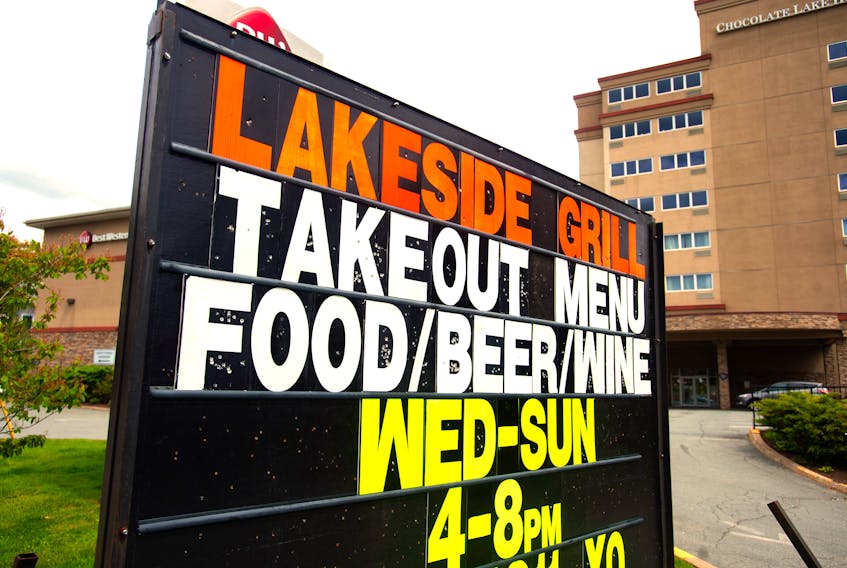Restaurant owners in Nova Scotia are hoping liquor regulations loosened during the pandemic will stay that way, but the province won’t talk about it.
For the last two months, restaurants have been permitted to sell beer, wine and cider to takeout and delivery customers, a huge departure from the rules in normal times.
Restaurant owners hope it stays that way, even after restaurants are permitted to again have dine-in customers, a change that begins on Friday.
The division of Alcohol, Gaming, Fuel and Tobacco was asked to answer questions on the topic, but after thinking about it for 24 hours, refused to do an interview. Instead, a spokeswoman emailed a summary of the rules governing alcohol sales.
The road to new regulation
The loosened regulations followed lengthy lobbying by Restaurants Canada.

“I’ve been talking to them for nearly two years about this,” said Luc Erjavec, Atlantic VP for Restaurants Canada. “It’s not new, but with the advent of third-party delivery it has become the norm in much of the U.S. With the COVID crisis and the focus on takeout and delivery, it really renewed the call to do it here. Before COVID only one province did it, now 10 provinces do it. Nova Scotia is by no means a leader in this, we probably have one of the strictest regimes in the country on it.”
A national survey of restaurant owners shows most of them are in favour of being allowed to sell booze to takeout and delivery customers, and say it has a positive impact on their business.
Erjavec hopes Nova Scotia keeps the new rules in place.
“It’s been positive for the industry and we’ve shown that we can do it responsibly, so I see no reason why this couldn’t be expanded and made permanent,” he said. “We never held this out to be a panacea, it’s just one more tool in the tool chest to try to help operators.
“Nova Scotia is more restrictive than most provinces. They only allow us to do beer and wine, which is not normal. We’re not allowed to do third-party delivery, only delivery by (restaurant) employees, and they limit the amount of alcohol per food order, which is different than other provinces. For example, the only restriction in New Brunswick is you can’t sell to minors. But you can sell draft, you can sell mixed drinks, cider, whatever…you can do takeout, delivery or third-party delivery.”
Liquor delivery not always booming
We aren’t allowed to sell any of the blended spirits, which is surprising and a little ridiculous.”
- Matt MacIssac
Matt MacIsaac, who runs Krave Burger in downtown Halifax, said the demand for alcohol by takeout and delivery customers has been inconsistent.
“It’s definitely more popular at times when the liquor commission is closed,” MacIsaac said. “Hopefully, it’s something they’ll keep going. I don’t see why they wouldn’t allow it, you can do it in other parts of the country.”
MacIsaac said the first weekend of the temporary rules, customers cleaned the restaurant out of booze. Craft beer has been the most popular item.
“And, ironically, Corona,” he said. “We aren’t allowed to sell any of the blended spirits, which is surprising and a little ridiculous, but our laws we have in Nova Scotia — the ready-to-drink cocktails are the fastest growing sector … but we can’t sell Blue Lobster by the Nova Scotia Spirit Company because it’s considered a hard liquor.”
In Newfoundland, the government has announced that new measures to help restaurants, wineries and craft breweries during the pandemic will be temporary.
Those measures allow breweries and wineries to deliver to homes, and permit anyone ordering food for home delivery to also order alcohol.
“Between ourselves and government, we really wanted to put something together that would have an impact on the (hospitality) sector,” said Newfoundland and Labrador Liquor Corp. CEO Bruce Keating. “They are a very important part of how we exit, coming out of the economic downturn that we’ve experienced because of the crisis.”
The NLC is also waiving liquor licensing fees for the 2020-21 fiscal year for restaurants, bars and any other establishment with a liquor licence.
With David Maher in St. John's, N.L.









